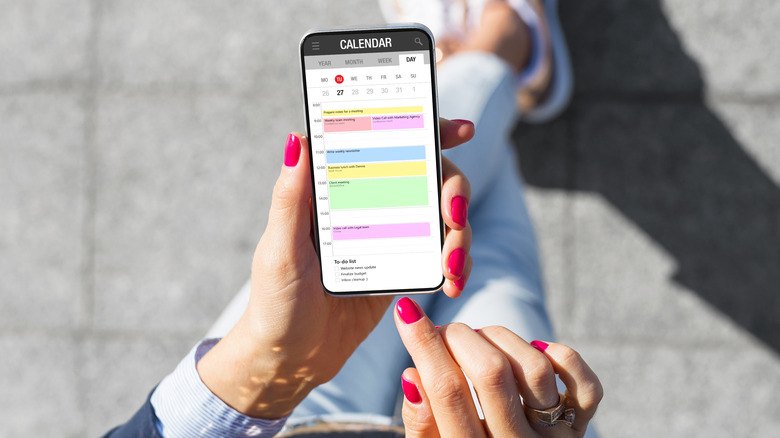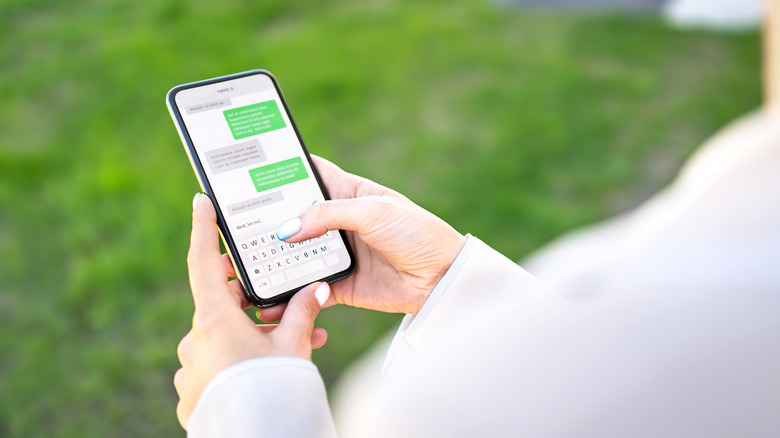The 5 Best Ways To Break Your Screen Time Habit
If you're having a love-hate relationship with your screens, you're not alone. The average American spends over seven hours a day looking at their phones, televisions, and computers, per Comparitech. The habit became even more apparent when the pandemic hit in 2020. We shifted to working from home, which meant less time interacting in-person and working on our computers for longer hours. And when activities outside of the house were discouraged, many turned to social media and television for some safe entertainment. And even though the world is reopening, many of us are still stuck in this routine.
But does excessive screen time really affect us badly, or is it just a normal habit? "We know that too much of anything that puts a strain on your eyes is not good for your health," says Vivian Tran, an internal medicine physician at Scripps Clinic Mission Valley. "Excessive screen time can also result in headaches, neck, shoulder and back pain and make it hard to fall asleep" (via Scripps). But beyond aches and pains, there are several reasons to cut back for the sake of our health. According to the Mayo Clinic, reducing screen time can prevent obesity, encourage exercise, promote healthy relationships, and improve mental health.
Are you feeling inspired? Try out these five ideas to break your screen time habit and experience the real world instead. After all, we only live once.
Acknowledge the issue
Becoming fully aware of your issue can be an excellent way to take the first steps towards improvement. Smart phone settings, notably on iPhones, allow you to view how much time you spend on your phone and on specific apps. Sometimes, just finding out the truth can be shocking enough to kick the habit, or at least leave you mindful enough to decrease your time on electronics.
If you work out of a home office, you obviously have requirements to meet, so it wouldn't be probable to cut your screen time altogether. But you can start by taking stock of how often you take breaks throughout the workday — and your posture.
Replace your screen time with something more enticing
It seems simple, but the easiest way to reduce your screen time is to replace it with something better. It can be easy to get sucked into scrolling through your favorite app, so that's why scheduling activities you enjoy will pull you away from your phone (via Norton). Take it one step further and schedule reoccurring workout classes, play dates, or Sunday dinners with family and friends every week.
You can also reconnect with your favorite hobbies like crafting, hiking, or tennis. Find out the local events in your neighborhood, and support small businesses and farmer's markets instead of shopping online. Once we turn off our screens, hours of free time can open up.
Define your workday
When the pandemic hit in the spring of 2020, one-third of the workforce transitioned to working from home (via NCCI). No one missed the commute but delineating when the workday started and ended became a struggle. To remedy this issue, Flexjobs suggests defining a strict end time to your workday, and when that time comes, put your computer away. Make sure it is hidden in a drawer and out of sight, so you aren't tempted to log back in.
Symbolizing the end of your workday by leaving for the gym or simply lighting a candle can signal the transition to end work and start relaxing.
Set an intention to your screen time
Setting a purpose for your screen time can be beneficial for work and your personal time on electronics (via CNBC). Start by time blocking your tasks. For example, check email in the mornings from 9 am to 10 am and check social media for 30 minutes after lunch. Avoid logging on just because you are bored, which leads to endless scrolling. Instead, use an app like Pinterest to find a recipe for dinner, or use the internet to search for an update on a specific news topic. Once you've found your information, put away your device.
Set boundaries
There's no denying that our screens are constantly enticing us; therefore, we have to set boundaries to avoid the temptation. Several apps, like Instagram, now allow you to set daily time limits. Turning off notifications from your apps will also help you from unnecessarily looking at your phone. Lastly, keep your bedroom free from screens, including phones or a television. Since blue light affects your natural circadian rhythm, Sleep.org suggests putting away your phone 30 minutes before bed for a healthy night's rest (hence people wondering if blue light glasses are actually worth it).
In a world where we are constantly connected, the biggest luxury we can offer ourselves is to unplug.





